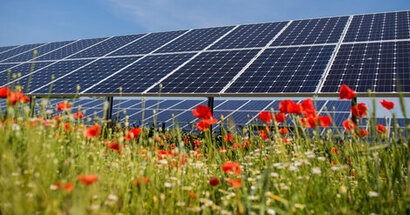
Solar farm development companies in England have a legal requirement to make their farms at least 10 percent better for nature (10 percent Biodiversity Net Gain), but Lightrock have doubled that - committing to making every single farm at least 20 percent better for nature.
Through the partnership, the RSPB will advise Lightrock on how to make that commitment a reality, and even push beyond it. At Woolpots Solar Farm in North Yorkshire, for example, the RSPB provided advice on how to create a haven for local wildlife. Soon this Lightrock-planned solar farm will deliver a net gain of 208 percent for nature, due to a wide range of actions including:
sowing wildflowers to provide food for pollinators.
creating gaps at the bottom of fences to create ‘hedgehog highways’.
gathering cuttings of wood into piles to give a home to invertebrates, reptiles, and amphibians.
putting up bird and bat boxes.
planting new trees and hedgerows to provide homes for wildlife and capture CO2.
This is all on a solar farm that will be able to power up to 15,000 homes or 19,000 electric vehicles a year, saving up to 21,000 tonnes of CO2 from entering the atmosphere.
Lightrock, a small company of five founded in 2017, is also committed to involving local communities in all their projects. Through listening to local communities they’ve altered layouts and transport routes, funded high-vis jackets for a local Scouts group, and invested in drainage to decrease local flood risk.
“The wide-ranging expertise RSPB can offer us through our partnership is exactly what we need to help us achieve our aim of exceeding industry best practice” said Chris Sowerbutts from Lightrock. “We are thrilled to be working with them to explore new methods of designing nature-friendly solar farms.”
For additional information:

